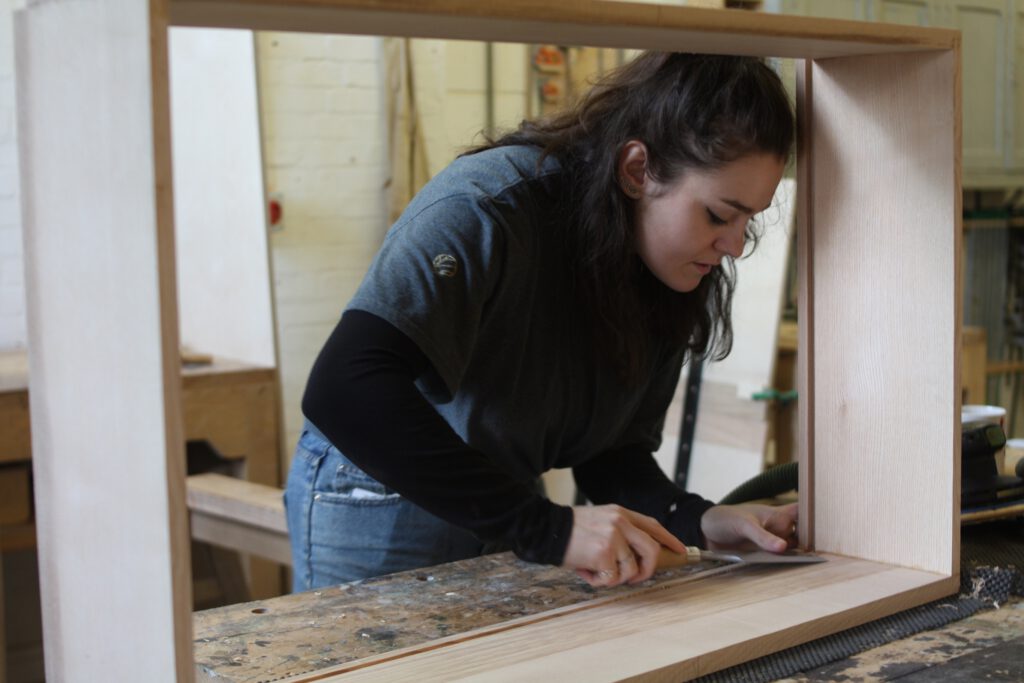Woodworking apprenticeship was the right route for talented designer

British Woodworking Federation @BritWoodFed member Building Crafts College @thebcc_london, and #apprentice Indira Esser-Dunbar, champion #NationalApprenticeshipWeek
As a highly-talented product design student at school, Indira Esser-Dunbar faced a major decision: study at a top university or take an apprenticeship related to the woodworking and joinery industry where she wanted to forge a career, and develop her skills on the job.
Fast forward to 2019 and Indira had completed her Level 3 NVQ diploma in Architectural Joinery, an apprenticeship run through the Building Crafts College, a British Woodworking Federation (BWF) member, the same year she was announced as a finalist in the BWF Awards’ Apprentice of the Year category.
Through the support of her college and employer she has developed both technical and project management skills, and is now in charge of the apprenticeship programme run by her employer – London-based furniture maker Sebastian Cox Ltd.
Indira, her college and employer share the story behind her success, and explain why they think apprenticeships are hugely positive both for individuals and the wider woodworking and joinery manufacture industry.
Taking the plunge
“For many young people in Indira’s position, starting a woodworking apprenticeship is a brave step, as many feel pressured into taking the university route, which for some is not the right option,” said Travis Warrington, apprenticeships tutor at the Building Crafts College.
“For those who are practically-minded and want to learn about all aspects of the woodworking profession, apprenticeships are a fantastic route into the industry and set people on their way to very successful careers.”
Indira said of her own experience: “Having studied product design at GCSE and A-Level, I was being pushed to go to university, but I struggled to find a course that was hands-on and that focused more on the making than the theory, so I started to look around at my options. I did an internship at Sebastian Cox Ltd while I studied for my A-levels and liked it so much that I stayed on to do my apprenticeship there.”
A structured learning programme
Guided by the learning framework provided by her college and employer, Indira has developed core technical and management skills that are essential for a successful career in woodworking.
She said: “My job is obviously heavily based on practical work, but even the college aspect is very hands-on which I really like. It’s a change of environment from the employer side which is great as it teaches you to work around different styles of people and ways of working.”
In college, Indira has completed a number of large joinery projects including a half-scale door and lining, a staircase with traditional bullnose step and, at level 3, a semi-circular arched door and quarter turn stairs. Travis said: “Indira has shown massive skill, knowledge and interest during her time studying, and completed her projects to the highest standard at every level of the apprenticeship.”
Transferring skills to the workplace
The skills Indira has gained have enabled her to flourish in her role at Sebastian Cox Ltd, where she has worked on live projects from the outset. Indira said: “Within my first year I have been working on exciting furniture projects, and my roles are getting progressively more technical in terms of the skills I’m using and the types of projects I’m working on.”
Aside from her hands-on work, Indira has played an active role in project management, and leads the training programme for the newest apprentice that Sebastian Cox Ltd employs – helping to ensure they are instilled with the same attitude and desire that Indira has.
Addressing the woodworking skills gap
Sebastian Cox, director of the company of the same name which he founded in 2010, hadn’t
employed an apprentice before hiring Indira, but the experience has led him to re-evaluate his approach to recruitment.
He said: “We’ve always tended to employ younger people here, but when I started out with my own company I took on people who had come from university doing woodworking, which was the route I took myself. However, as these courses ceased to be taught by Universities, the pool of appropriate candidates became smaller, leaving people who didn’t have the right woodworking or machinery experience.
“This was the reason I decided to take on my first apprentice in Indira, and it has been such a positive experience that I have hired our second apprentice – a process we began with Indira’s input and leadership. I would encourage all other employers to consider hiring apprentices – it isn’t a scary process and it allowed us to find the right person that had the passion and skill that we need for our creative business.”
A bright future
For Indira, the choice she made when she was 17 was undeniably the right one. She said: “I couldn’t be happier with the option I have taken, and a lot of my friends are considering retraining, realising that university wasn’t what they had thought it would be.”
She added: “I think it’s really important to make people aware that there are more options out there than just academic subjects. Even if you are a high performer at school, the apprenticeship route is a way of getting to do what you love doing and going straight into employment.”
Helen Hewitt, CEO of the British Woodworking Federation said, “Apprenticeships are the stepping-stone into our industry, and are essential for recruiting the next generation of talented individuals to our creative profession.
“We work closely with our members, education partners and other stakeholders to maintain and develop apprenticeship standards to ensure that they remain fit-for-purpose. This approach is vital as innovative new technologies and manufacturing techniques continue to place new demands on skills, training and continuous development in the sector.
“The BWF’s work on apprenticeship standards is part of a wider approach to skills and training that we’ll be placing a major focus on in 2020 and beyond, targeting three key areas – talent attraction, apprenticeships and leadership development. Through the upcoming launch of our new education programme, WOW I MADE THAT!, aimed at inspiring students in Years 9-12 to get into woodworking, we continue to champion apprenticeships as the next step on a positive and progressive route to a rewarding and diverse career.”












Responses